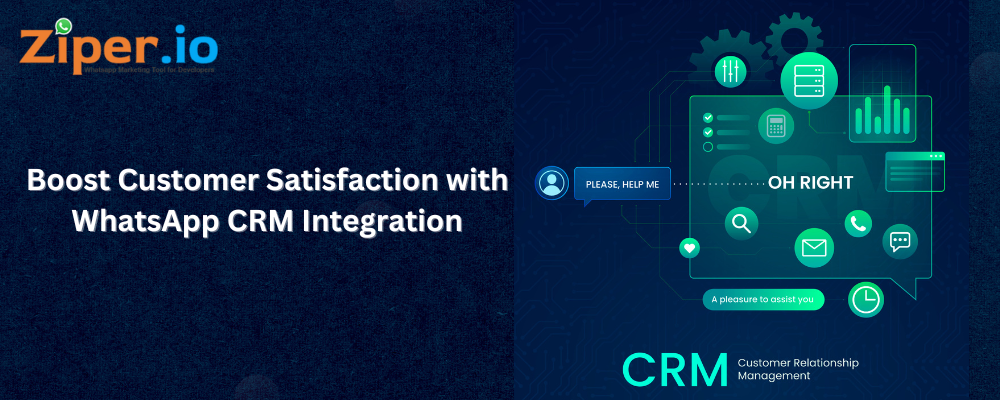Boost Customer Satisfaction with WhatsApp CRM Integration

In today's digital era, effective customer relationship management (CRM) is crucial for businesses to thrive and succeed. One powerful tool that can significantly enhance customer satisfaction and engagement is WhatsApp CRM integration. By leveraging the WhatsApp platform along with the capabilities of a CRM system, businesses can streamline communication, provide personalized experiences, and foster stronger relationships with their customers.
The Importance of Customer Satisfaction
In a highly competitive business landscape, customer satisfaction plays a pivotal role in maintaining a loyal customer base and driving revenue growth. Satisfied customers are more likely to become repeat buyers, refer others to your business, and leave positive reviews. With the rise of messaging apps as a preferred mode of communication, integrating WhatsApp into your CRM strategy can significantly boost customer satisfaction and take your customer relationships to new heights.
Understanding WhatsApp CRM Integration
WhatsApp CRM integration refers to the process of connecting WhatsApp, a popular messaging platform, with your CRM system. By integrating these two powerful tools, businesses can centralize customer interactions, automate messaging, and gather valuable data for more informed decision-making. This integration allows you to manage customer conversations, track customer preferences, and deliver personalized experiences seamlessly.
Implementing WhatsApp CRM Integration
Successful implementation of WhatsApp CRM integration requires careful planning and execution.
Selecting the Right CRM System
Choose a CRM system that supports WhatsApp integration and aligns with your business needs. Look for features like messaging automation, contact management, and reporting capabilities to ensure a seamless integration process.
Integrating WhatsApp into Your CRM
Follow the integration instructions provided by your CRM system and WhatsApp Business API documentation. This process typically involves setting up a WhatsApp Business Account, configuring APIs, and establishing secure connections between your CRM system and WhatsApp.
Setting up Automation Workflows
Leverage automation workflows within your CRM system to streamline communication and save time. Create predefined templates, automated responses, and chatbots to handle common customer inquiries and provide instant support.
Ensuring Data Privacy and Security
When integrating WhatsApp with your CRM system, prioritize data privacy and security. Comply with relevant data protection regulations and implement secure protocols to protect customer information and maintain their trust.
Leveraging WhatsApp Cloud API
What is WhatsApp Cloud API?
WhatsApp Cloud API allows businesses to access WhatsApp's messaging capabilities programmatically. It provides a secure and scalable solution for integrating WhatsApp into your CRM system, enabling you to send and receive messages, manage contacts, and utilize advanced features.
Key Features and Capabilities
WhatsApp Cloud API offers features like message templates, media sharing, group messaging, and message automation. These capabilities empower businesses to deliver rich and interactive experiences to their customers through WhatsApp.
Integration Process and Requirements
To integrate WhatsApp Cloud API, you need to follow the guidelines provided by WhatsApp Business API documentation. This includes registering your business, obtaining necessary credentials, and configuring the API endpoints to establish a connection between your CRM system and WhatsApp.
Use Cases for WhatsApp Cloud API
WhatsApp Cloud API can be utilized for various use cases, such as transactional notifications, order updates, appointment reminders, and customer surveys. By leveraging the API's functionality, businesses can automate communication, enhance customer experiences, and drive engagement.
Utilizing WhatsApp Marketing Software
What is WhatsApp Marketing Software?
WhatsApp marketing software offers a comprehensive set of tools and features specifically designed for businesses to leverage WhatsApp for marketing purposes. It allows you to create and manage marketing campaigns, analyze performance metrics, and engage with customers efficiently.
Features and Functionalities
WhatsApp marketing software typically includes features like contact management, message scheduling, personalization options, campaign analytics, and segmentation capabilities. These features enable businesses to execute targeted and effective marketing campaigns through WhatsApp.
Creating Targeted Marketing Campaigns
With WhatsApp marketing software, you can create highly targeted campaigns based on customer segments, demographics, or purchasing behavior. Craft compelling messages, incorporate multimedia content, and schedule campaigns at optimal times to maximize their impact.
Analyzing Campaign Performance
WhatsApp marketing software provides robust analytics and reporting features that allow you to track the performance of your marketing campaigns. Monitor metrics such as message delivery rates, open rates, click-through rates, and customer responses to gain valuable insights and optimize your future campaigns for better results.
Best Practices for Successful WhatsApp CRM Integration
To make the most of WhatsApp CRM integration, consider the following best practices:
Building Opt-In Customer Lists
Ensure compliance with WhatsApp's policies by obtaining explicit consent from customers before adding them to your WhatsApp contact list. Implement opt-in strategies through your website, mobile apps, or offline channels to build a permission-based and engaged customer base.
Crafting Engaging and Relevant Content
Create compelling and relevant content that resonates with your customers. Tailor your messages to their preferences, needs, and buying behavior. Use a conversational tone, incorporate emojis, and encourage two-way communication to foster engagement and build stronger relationships.
Personalizing Messages and Offers
Leverage the customer data stored in your CRM system to personalize your WhatsApp messages and offers. Address customers by their names, recommend products based on their purchase history, and send personalized discounts or rewards to enhance their experience and loyalty.
Monitoring and Analyzing Metrics
Regularly monitor and analyze the performance metrics of your WhatsApp CRM integration. Track key indicators like response times, customer satisfaction ratings, and conversion rates to identify areas for improvement and make data-driven decisions to optimize your customer engagement strategies.
Conclusion
Integrating WhatsApp into your CRM system can significantly boost customer satisfaction, enhance communication, and foster stronger relationships with your customers. By leveraging the capabilities of WhatsApp Cloud API and utilizing WhatsApp marketing software, businesses can streamline their CRM processes, deliver personalized experiences, and drive higher levels of customer engagement.